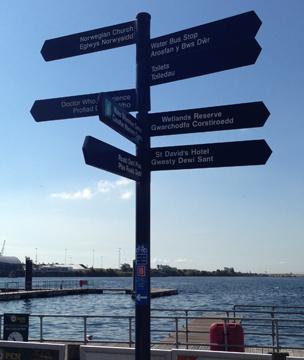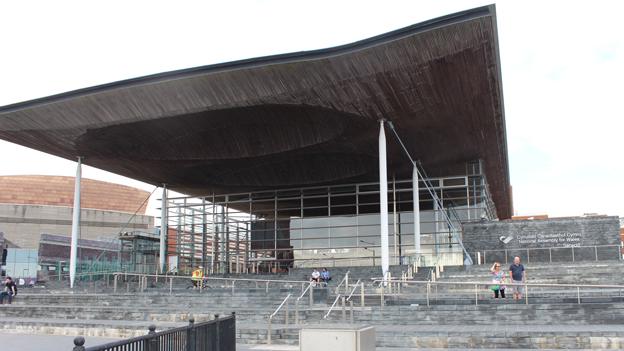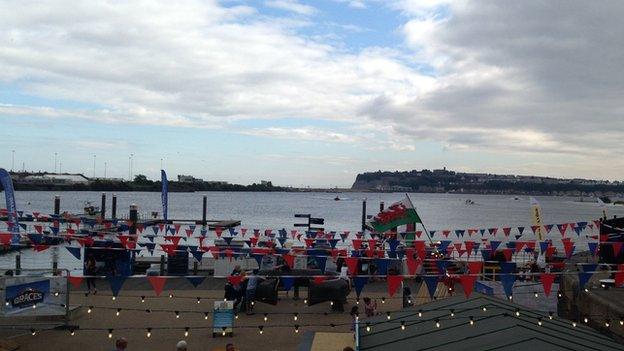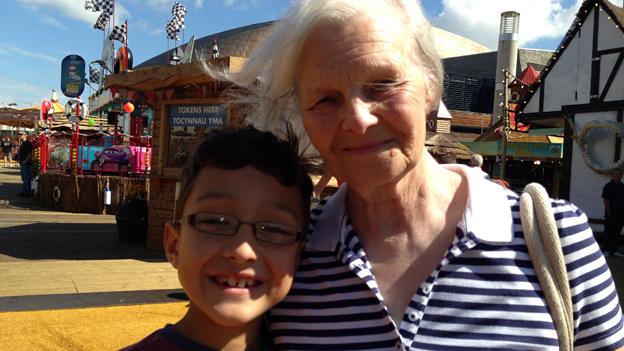Scottish independence: Why Wales will decide for itself
- Published
Scotland has links with Wales - including the Marquis of Bute in Cardiff
With the Scottish referendum just weeks away, all eyes are on Scotland. But what would a "Yes" or "No" vote mean for Wales, and how much appetite is there for Wales to get more powers too?
Wales has just as strong a national identity as Scotland - evident in everything from sport and opera to the ubiquitous Welsh dragon and bilingual road signs.
With a population of 3.1m, Wales is the smaller of these Celtic nations.
But while many people may assume that Wales - which first took on devolved powers at the same time as Scotland in 1997 - is watching the Scottish debate with its sights set on an independence referendum of its own, in Wales it seems there is little appetite for going it alone.
A recent BBC poll found 5% of Welsh voters want to see an independent Wales, rising to 7% in the event of an independent Scotland.
Another poll put that figure at 14%, while 17% said a "Yes" vote should lead to more powers for Wales.

Signs frequently appear in both Welsh and English
There are certainly some voices calling for change. Leanne Wood, leader of Plaid Cymru, has predicted Wales will be independent within "a generation".
"If there is a 'Yes' vote I think people will look over Hadrian's Wall and see a kind of politics that's markedly different to Westminster, with its bedroom tax, privatisation of the health service, expensive tuition fees.
"Wales and Scotland are different countries on different stages of our devolution journey. I'd like us to move from devolution to a system of self-governance, which we need to turn our weak economy around," she says.
First Minister Carwyn Jones - who is no fan of Scottish independence - has called for a "reserved powers" model of devolution, where powers are assumed to be devolved unless specifically reserved.
The Welsh Labour leader has also consistently called for a constitutional convention to discuss the future of the UK and "how it might function more responsively to the needs of its constituent parts", however Scotland votes.
In 2012, he suggested a new upper House of Parliament, modelled on the US Senate with equal representation for Wales, Northern Ireland and England.
It is the current "very asymmetrical, higgledy-piggledy constitutional agreement" that "is not fit for purpose" that many people in Wales are primarily concerned about, according to Dr Rebecca Rumbul, manager of the Welsh Governance Centre.
She is concerned that Wales will be sidelined irrespective of how the referendum pans out.
'Ambivalent'
"A 'Yes' vote would take the English majority in Westminster from 85%, which is still huge, up to about 92%. That leaves Wales and Northern Ireland as mice sleeping next to an elephant - regardless of what Welsh MPs or Northern Irish MPs were voting for, they would never really have any kind of significance against the weight of the English MPs," she says.

The Welsh Assembly was set up after a referendum in 1997
Counter measures, weighting or further devolution to Wales and Northern Ireland would be one way to address that, she argues.
But a "No" Scottish vote could also have a negative knock-on effect on Wales.
"Scotland is going to be a big issue on the table for many months to come. Wales has always been the runt of the litter in the devolution game, and we may find ourselves jumping up and down waving our hands saying 'look at our settlement please'," she says.
Wales could end up being "pulled towards independence by default", as a result - "not because it wants it, but because Welsh matters are not being heard by Westminster", she argues.
However, while Rumbul feels strongly about what the repercussions of the Scottish referendum may be, she says the Welsh are generally "quite ambivalent" about it.
"The relationship between England and Wales is normally thought of as being more relevant to the Welsh public," she says.
Her point seems to be borne out in a survey at the Cardiff Beach Bay festival.

The Welsh flag is a familiar sight in Cardiff


Yvette Evans doesn't think the Scottish referendum will affect Wales
Yvette Evans, from Cardiff, says she feels closer to the English than the Scottish.
"With Scotland being so far up north it doesn't really affect us. I think it's entirely up to them - we shouldn't interfere," she says.
Jason Hill, 42, from Llanelli, agrees. "I can't see a problem - if Scotland wants independence they can have it," he says.
He doesn't think the outcome - whatever it may be - will have any impact on Wales. And he doesn't want Wales to follow in Scotland's footsteps by having a referendum.
"I'm very patriotic, I feel very, very Welsh, but I don't want Wales to have more powers. Things are alright here at the moment - they could be better, but it's all swings and roundabouts," he says.

Jason Hill, 42, from Llanelli, doesn't want Wales to have more powers
However, Christine Nicholas, 45, from Porthcawl, says she would prefer it if the UK stayed together. "It could have a bad impact on the rest of Britain," she says.
Jon Blackburn, 69, from Cardiff, also wants Scotland to stay. "If Scotland breaks away, the next thing Wales will want more powers and I don't think we are a big enough country to have that independence," he says.
Researchers at Cardiff University and the University of Edinburgh, external found that 61% of Welsh people wanted Scotland to stay in the union, compared to 19% who favoured a "Yes" vote. About 21% said they didn't know.
The Welsh government, which has power to control education, health and local government, has taken a more cautious approach towards further devolution than the Scottish Parliament, but is gaining more power nonetheless.
In 2011, the nation gave a resounding "Yes" in a referendum on direct law-making powers for the assembly.
Two reports on the future of devolution by the Silk Commission have also recommended devolving youth justice and policing, large-scale energy projects and giving new tax and borrowing powers to Wales.
A Wales Bill, external- which devolves limited tax-raising powers and paves the way for a referendum on devolving income tax - is currently before Parliament.
However, any appetite for further devolved powers doesn't seem to be fuelled by what's going on in Scotland.
Nearly two-thirds of Welsh voters believe a Scottish vote for independence should not change the way Wales is governed, according to a recent poll.
If Wales does move towards independence, it looks like it will do so on its own terms.


A referendum on whether Scotland should become independent is to take place
People resident in Scotland will be able to take part in the vote, answering the "Yes/No" question: "Should Scotland be an independent country?"
The referendum will take place on Thursday, 18 September, 2014
Go to the BBC's Scotland Decides page for analysis, background and explainers on the independence debate